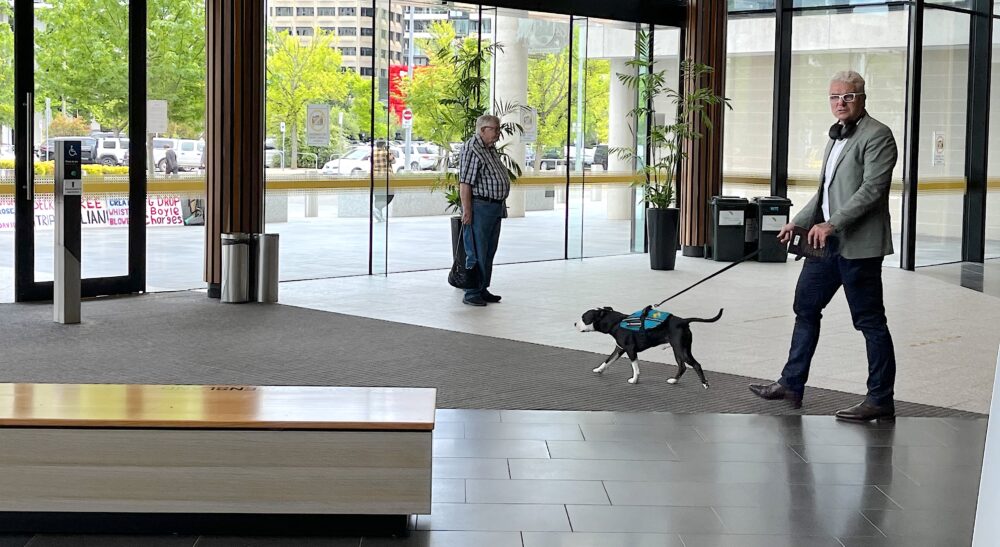The Supreme Court’s chief justice denied whistleblower David McBride’s attempt to appeal the trial judge’s decision to deprive him of a public interest defense, reports Joe Lauria.
By Joe Lauria
in Canberra, Australia
Special to Consortium News
Australian whistleblower David McBride’s failure to get a Supreme Court judge on Thursday to allow an appeal of the trial judge’s ban on a public interest defense was yet another setback in his quest for justice.
McBride, who leaked evidence to the media of Australian war crimes in Afghanistan, faces 10 years in prison on five counts, including stealing government property and unlawfully communicating classified information to journalists.
Though a government report found that 39 unarmed Afghans were murdered by Australian forces, McBride’s lawyers will be unable to argue to the jury that he’d followed a higher duty to the nation than merely obeying military orders intended to suppress evidence of war crimes.
The trial judge ruled on Wednesday that McBride’s duty was only to follow his superior’s orders and not to serve the interests of the nation. The judge, Justice David Mossop, said he would instruct the jury to disregard any public interest defense. “There is no aspect of duty that allows the accused to act in the public interest contrary to a lawful order,” he told the court.
It was that ruling that McBride’s lawyers sought to appeal on Thursday. Stephen Odger, McBride’s chief counsel, argued before Chief Justice Lucy McCallum, who was to determine whether McBride would be allowed to appeal Mossop’s decision. Odger said:
“His only real argument is that what he did was the right thing. There was an order: don’t disclose this stuff, but he bled, he did the right thing, to use his language, and the question is does the fact that he’s in breach of orders mean that he’s in breach of his duty, so that he’s got no defence?
In this case if that’s right and he proceeds to trial it may well mean that the consequence is that he’s got no real alternative but to enter pleas of guilty and that would obviously shorten things but he seeks an opportunity to have that critical issue determined by the court of appeal.
A jury, if they did have a public interest test, would proceed on the basis that there is a powerful public interest that members of the defence force do obey orders but circumstances might arise in which that is not in the public interest.
If our contention is correct that there is a public interest component to service, then we accept that in the vast majority of circumstances it would be in the public interest that a member of the defence forces obey an order.
The effect of His Honour’s ruling is not that orders are relevant to the question of duty but rather that they trump anything else, so that you must obey.”
But McCallum rejected that argument, saying Mossop’s ruling was “not obviously wrong.” She added: “I am not persuaded that there is sufficient doubt about his honor’s ruling on either issue to warrant interrupting the trial.”
McBride reacted bitterly to the McCallum’s decision on X:
What does the ‘oath’ Australian soldiers swear mean? Yesterday it was answered by the judges of the ACT. pic.twitter.com/hnyyIAb1yF
— David McBride (@MurdochCadell) November 16, 2023
With McCallum’s ruling the case resumed under Mossop Thursday afternoon. He called a closed session in his courtroom to discuss the use of classified documents in the trial.
Mossop ruled that redactions must be made before they could be shown to the jury. Officials from the Attorney General’s office then removed unredacted documents possessed by the defense from the courtroom.
No Longer Classified
Outside the courthouse after McCallum ruled against McBride lodging an appeal regarding the public interest defense, McBride told Consortium News that he considered the documents he leaked to have lost their classification because evidence of crime cannot be classified in the first place.
Whom Does the Military Serve?
At the heart of the case are two questions: whom does a soldier serve? and is the military’s role in society to serve the entire community’s interests or only its own?
The rulings by two judges so far are that a soldier only serves his superiors and that the military essentially owes nothing to the public.
The prosecution has argued since Monday that McBride’s duty is only to military orders and not society’s interests.
The government says McBride broke laws of military discipline by leaking evidence of war crimes to the Australian media. McBride’s lawyers have conceded in court that he indeed broke such regulations but that he had a duty to the nation that superseded military discipline.
Trish McDonald, the chief prosecutor, argues that the concept of duty in the law means not it’s not in the public interest to reveal classified information to the public.
McBride’s primary duty, she said, was to follow orders. The accused was a legal officer, she asserted. He was not appointed to inform the press. He contravened his official duty. In fact, there is a public interest in non-disclosure, she argued.
Odgers, McBride’s chief counsel, on the other hand has contended that an Australian soldier’s duty is based on an oath to serve the British sovereign, whose duty is to care for the interests of the entire nation. It followed logically then that McBride’s duty was also to serve the nation, Odgers said.
But the prosecution said to “interpret ‘serve’ to mean to act in the pubic interest, is to turn on its head service to king or queen.” It is not “for the soldier to do whatever he thinks is right,” she said.
“Nowhere in the oath does it refer to public interest or that” a soldier “must act in the public interest,” she added. If it were, Parliament would have said so, she argued.
McDonald quoted a 19th century reference on military justice and statutory powers, saying, “There is nothing so dangerous to the civil establishment of the state as an undisciplined or reactionary army.”
For the defense, Odgers countered that, “The duty to serve the sovereign does not require blind obedience to orders.”
Odgers said in the “21st Century for the Crown to make the assertion that to obey unquestionably, the orders of superiors ignores Nuremberg and the acceptance in our society that members of the military have higher duties.”
The Nuremberg Tribunal that tried Nazi war criminals established that a soldier had a duty to disobey unlawful orders.
The prosecution had argued that the oath a member of Parliament makes to the Sovereign is fundamentally different than that of a soldier because an MP is representing the public.
The ruling of both judges that the Australian military is not responsible to the public underscores the fundamentally undemocratic nature of the military, rooted still in 19th Century thinking, when soldiers could not vote and had no democratic rights.
That has changed, yet the power of the military and attendant intelligence services are allowed to run roughshod over the interests of the entire nation.
Joe Lauria is editor-in-chief of Consortium News and a former U.N. correspondent for The Wall Street Journal, Boston Globe, and numerous other newspapers, including The Montreal Gazette, the London Daily Mail and The Star of Johannesburg. He was an investigative reporter for the Sunday Times of London, a financial reporter for Bloomberg News and began his professional work as a 19-year old stringer for The New York Times. He is the author of two books, A Political Odyssey, with Sen. Mike Gravel, foreword by Daniel Ellsberg; and How I Lost By Hillary Clinton, foreword by Julian Assange. He can be reached at [email protected] and followed on Twitter @unjoe



Mark this date on your calendar: the day Australia stepped into tyranny.
Who no mention of the Nuremberg trials where it was determined that a soldier following orders that went against international law then he is responsible for that choice. By following the order not to report the murder would make McBride an accessory to that crime. By swearing an oath to our monarch and the monarch not taking action, does that make the monarch an accessory to that crime?
Why does the High Court put military law above Federal law when we are constantly be told by our police to report a crime?
McBride’s chief counsel did make one overt reference to Nuremberg in court.
Reminds me of a fabulous movie called “Breaker Morant”
So, let me get this right. If the Australian Military decided to overthrow the elected government of Australia by shooting every Member of Parliament, it would be illegal for a soldier not to pull the trigger when ordered.
Good point Mousetrap. And it’s not just Australian soldiers committing these crimes:
Xxxx://www.theguardian.com/uk-news/2023/oct/09/sas-troops-executed-afghan-males-of-fighting-age-inquiry-hears